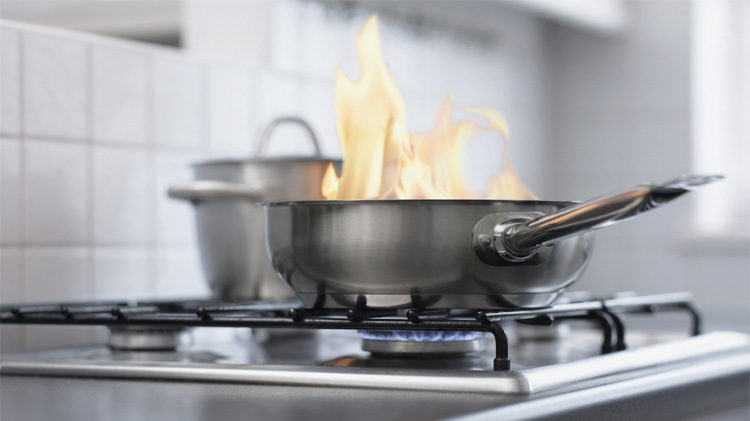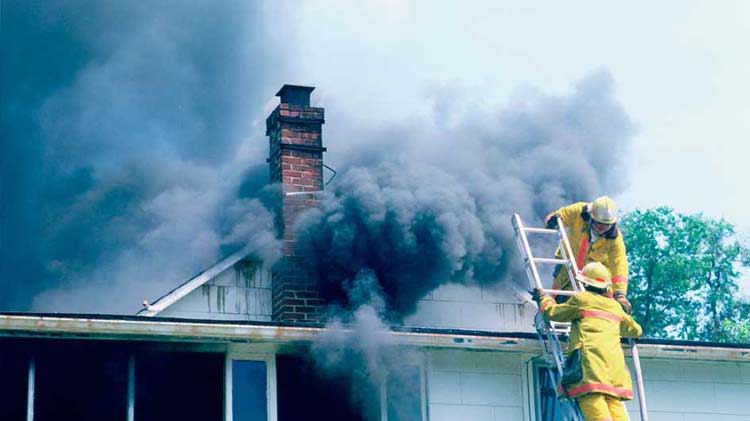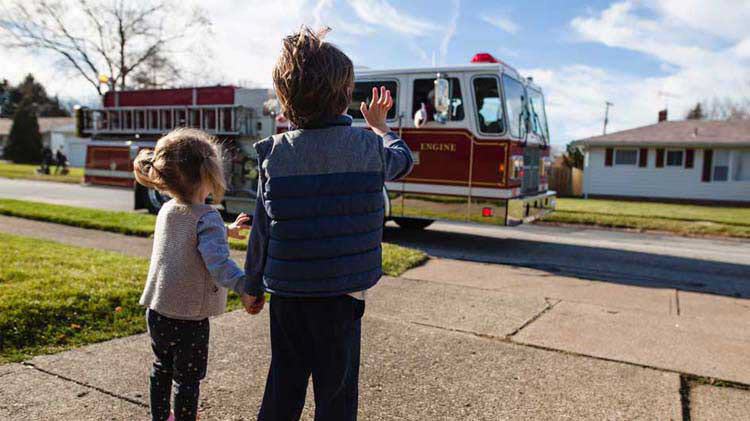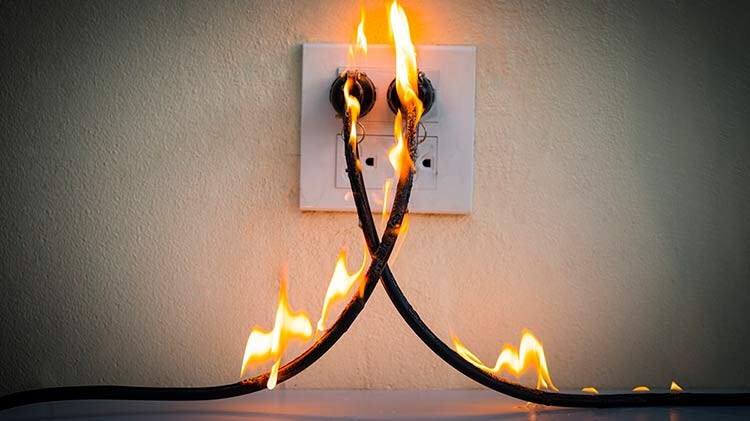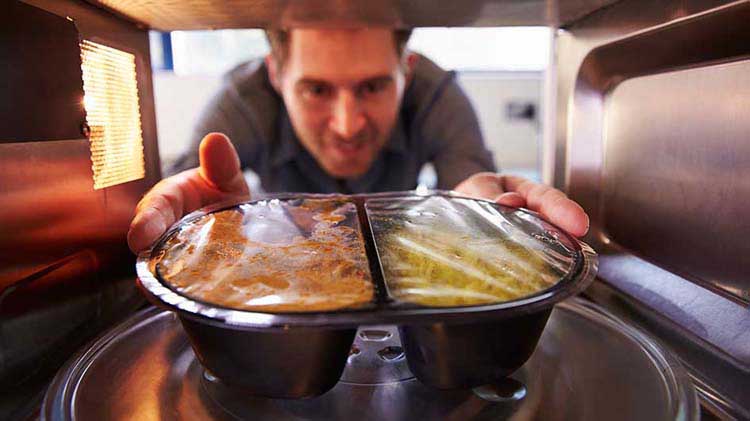Help protect your home against common causes of house fires
House fires can start in various ways, all resulting in danger. Familiarize yourself with these fire prevention tips to help reduce the risk.
Home fires are not only unexpected, but also unpredictable and can quickly spiral out of control. In 2022, local fire departments responded to an estimated 1.5 million fires in the U.S. By taking the basic precautions listed here, you could help stop a disaster before it starts.
What causes home fires?
In 2022, cooking was the leading cause of house fires, starting almost half of all fires in the United States. Heating is second among the leading causes, followed by unintentional fires and electrical malfunction.
Cooking fires
Follow these tips from the National Fire Protection Association:
- Set a timer and stay in the kitchen while grilling, frying or broiling food. If you need to leave your home for any reason, turn off the oven or stove.
- Put kitchen safety first by keeping your stovetop clear of anything that could catch fire, including oven mitts, wooden utensils, food packaging, towels or curtains.
- Keep a fire extinguisher in the kitchen.
- Don’t use the oven or stove if you have consumed alcohol or taken medication that can cause drowsiness.
If a cooking fire starts:
- Be prepared. Keep a lid nearby when you're cooking on the stovetop. If a small grease fire occurs, smother it by sliding the lid over the pan. Turn off the stove and leave the pan covered until it completely cools.
- Do not use water on a grease fire, always have a fire extinguisher handy and use it as soon as possible if needed.
- For an oven fire, turn off the heat and keep the door closed.
- Alert others in the home that a fire has started so they can either help extinguish the flames (only if it can be done safely) or evacuate and call for help.
- If you can’t properly extinguish the fire yourself, get out immediately! When you leave, close the door behind you to help contain the fire.
- Call 9-1-1 after you leave.
Heating equipment
- Consider replacing older space heaters with new ones that turn off automatically when overheated or tipped. Keep them at least three feet away from anything flammable.
- Have furnaces and chimneys professionally cleaned and inspected every year.
- All fireplaces should have a sturdy cover or screen. Never use flammable liquids to start a fire in a fireplace. Allow ashes to cool completely and use a metal bucket for disposal.
Electrical systems and equipment
- Have your home inspected by a qualified electrician, especially when purchasing an older home.
- Use a qualified electrician when having electrical work done, as poor electrical work can increase your risk of a home fire or injuries.
- Watch for the warning signs of faulty wiring. These can include blown fuses, visibly damaged wiring, discoloration around outlets, flickering lights or burning odors.
- Protect your home against arc faults. An arc fault occurs when an electrical short produces an arc: intensely hot sparks that can set fire to nearby flammable materials. Arcs often happen in appliances or extension cords that have become frayed or cracked.
- To help prevent arc faults, have Arc Fault Circuit Interrupters (AFCIs) installed in your home. These devices look and work like conventional circuit breakers. When an AFCI detects an arc, it shuts off the circuit.
- Power surges can damage electronics, appliances and even cause fires. Consider protecting your home with a two-tiered surge protection system: a whole house surge protection device (SPD) on the main electrical service to the home, and point-of-use SPDs for all valuable electronics and appliances.
- Smart sensor devices such as Ting, can help detect the invisible dangers lurking in your home. Consider purchasing a Ting smart plug to help monitor your home’s electrical network for any faults that can lead to fires. Ting also monitors the utility grid to help detect faults that could damage your home; all you need is the sensor, a home Wi-Fi network and a smartphone. And great news for State Farm customers: In most states, you can enroll in a program to receive a Ting for your home free of charge.
Candles
Each year, candle fires account for hundreds of thousands of dollars in property damage and hundreds of unnecessary injuries and deaths.
- Only burn candles under constant supervision.
- Keep burning candles a minimum of one foot away in all directions from flammable and combustible items.
- Place candles in safe locations, out of the reach of children or pets.
- Only place candles on secure furniture.
- Keep candle wicks trimmed to within one-quarter (¼) inch from the top of the candle.
- Do not allow candles to burn down to the bottom of their container.
- Extinguish all candles before leaving the house or going to bed at night.
Smoking
To help prevent accidental fires caused by smoking, the U.S. Fire Administration recommends that you:
- Smoke outside — many things inside your home can catch on fire if they touch something hot like a cigarette or ashes. It is always safer to smoke outside.
- Put cigarettes out all the way — do this every time. Don't walk away from lit cigarettes and other smoking materials. Put water on the ashes and butts to confirm that they are really out before you dispose of them.
- Be alert — do not smoke after taking medicine that makes you drowsy. You may not be able to prevent or escape from a fire if you are sleepy.
- Never smoke around medical oxygen — as it can explode if a flame or spark is nearby. Even if the oxygen is turned off, it can still catch on fire.
- Never smoke in bed — mattresses and bedding can catch on fire easily.
- Put your cigarette out in an ashtray or bucket with sand — use ashtrays with a wide base so they won't tip over and start a fire.
Christmas trees
Help make your holiday season safer by taking a look at these simple holiday safety tips:
- Confirm that your live tree is fresh. The needles should be hard to pull from the branches and difficult to break when bent between your fingers.
- Place the tree away from heat sources such as fireplaces, vents and radiators.
- Check the water level daily and verify that the stand is filled with water.
- See that your tree doesn’t block doorways and is out of the way of foot traffic.
- Look for the “Fire Resistant” label if you buy an artificial tree.
Potential fire hazards at home
Just by being aware of common fire hazards and keeping an eye out for problems, you could help save your home and possessions from serious damage. Here are some to be aware of:
- Electrical cords — look for any fraying or cracking of your cords. If you see any, replace the cord immediately. Remember to grasp the plug, not the cord, when disconnecting it from a power supply to avoid causing damage.
- Extension cords — avoid using octopus plugs which allow many cords to be plugged into a single outlet and don't plug too many extension cords together. One high-wattage appliance per outlet is recommended.
- Light fixtures and switches — replace buzzing or sparking switches and watch for panels that are hot to the touch. Have an electrician review the electrical system in your home as these may be signs the system needs to be rewired or updated.
- Light bulbs — do not use light bulbs with a higher wattage rating than recommended on the fixture.
- Clothes dryer — include cleaning the lint trap as part of your regular laundry routine. Left untouched, lint can build up in your dryer duct with every load of laundry. Aim to have a professional inspect and clean your dryer at least once a year to help reduce your risk of fire.
- Glassware — when sunlight passes through some kinds of glassware, the concentrated rays can ignite flammable materials such as stacks of paper. Play it safe by moving all glass accessories, such as vases, away from windows.
- Loose batteries — store unused batteries in their original packaging and cover the posts (exposed metal portions) of expired batteries with black electrical tape before properly disposing of the batteries.
- Electric blankets — keep your blanket flat while using it and confirm that it is certified by a national testing laboratory, such as UL.
- Garbage cans — refrain from disposing cigarette butts and other fire-prone items in your main can. Consider having a separate container for these items.
If you spot a fire, call 911 immediately. Can't find the source of the smell? Contact your fire department — it's better to be safe than sorry. If there's no fire but you suspect a mechanical or electrical problem, contact a licensed repair technician as soon as possible.
Practice fire prevention year-round with these tips from State Farm®.
